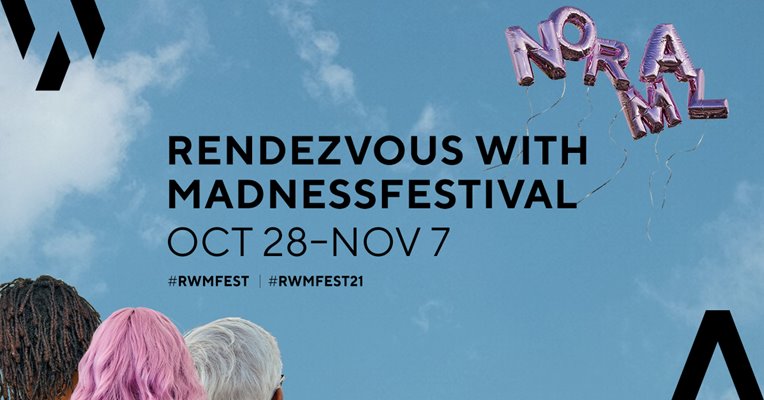Featured Story
October 2021
 Rendezvous with Madness 2021 promo image
Rendezvous with Madness 2021 promo image
“Normal.” This is a word that is often called upon as the world continues to grapple with the covid-19 pandemic. Questions like: when will we return to normal, what will become our new normal, or is normal even desirable, are often raised. “Normal” is also the word that appears in the marketing materials of the 29th iteration of the Rendezvous with Madness Festival (RWM), a multidisciplinary festival that aims to reduce stigma around mental health and addiction issues. Pink inflatable balloons floating in the air spell the word out, and, depending on the viewer’s perspective, the balloons can be seen as either floating away, or coming towards you.
“I think we are all unpacking this together” notes Kelly Straughan, Executive Artistic Director of Workman Arts, the organization that runs the Festival. Yet with all of the adjustments we’ve made as a society because of the pandemic, and as the city opens up, it’s safe to say that we’re experiencing something new; this is what shaped the vision of RWM 2021, taking place October 28 – November 7, 2021. Operating in a hybrid form by offering audiences the choice to attend both online and in-person (at 50% capacity), the entire festival experience will be different, new, and certainly thought-provoking.
Located in The Centre for Addiction and Mental Health (CAMH), Workman Arts offers both member-only and public-facing programming. Professional semestered training courses in Media, Literary Arts, Music, Theatre and Visual Arts, are available to its 500 member artists who identify as having lived experience of mental health or addiction issues. These courses, while focusing on artistic practice, have the added mental health benefits of reducing social isolation and promoting productive habits, notes Straughan.
Its public-facing programming, including its flagship Rendezvous with Madness Festival, the annual Being Scene juried art exhibition, and presentations that take place throughout the year, not only empower artists with lived experience, but also serve to reduce the stigma around mental health and addiction issues. Their public programming, states Straughan, “does what art does: they promote empathy and understanding, and you get to see what it’s like to walk in someone else’s shoes,” she says.
RWM wasn’t always a multidisciplinary festival. In 2018 in its 26th year, it grew from a film-only festival to include many other types of art, like visual arts, media arts, performance art, theatre and dance. “With different art forms, there are different experiences, different entry points, and obviously different conversations,” says Straughan. With visual arts, she notes as an example, audiences have agency over their viewing experience; you can decide how long you want to view a piece, and your own experience informs your interpretation.
The immersive aspect of other art forms provide a multitude of avenues with which to challenge and advance perspectives on mental health. Straughan recalls past festival presentations including a space that was designed to make audiences understand what it’s like to have voices in your head all the time, and Psychosis from 2019, a dance piece created by choreographer Ronald Taylor that shows a psychotic breakdown in a very visceral way. Workshops, post-screening conversations and Q&A’s are also a staple of the Festival. “The discussions are important to unpacking the art together,” says Straughan.
While switching to online fully in 2020—and again partially for this year—was necessary for health measures, the move has proven to be beneficial for film audiences. Straughan explains: “It seems like online has been a nice addition for people who have discomfort being in large groups or have accessibility issues or mental health reasons why they’re not comfortable out in public.” With online, they can still be a part of the festival experience, and for film at least, showing it online does not sacrifice the quality or intention of the art.
RWM 2021 will feature a variety of works, including the opening night film Kímmapiiyipitssini: The Meaning of Empathy by filmmaker Elle-Máijá Tailfeathers which chronicles the impact of the opioid crisis on Alberta’s Kainai First Nation, the In(site) Exhibition featuring works that are intended to be experienced virtually, and the theatre production of Rosa Laborde’s True which centers around an aging father who develops Alzheimer’s.
For those working in the arts sector who want to engage in the conversation further, Workman Arts’ BigFeels: Post Radical Growth Symposium: Making Space for Mental Health in the Arts is taking place November 1-3, 2021.
----
Workman Arts receives funding through Toronto Arts Council’s Creative Communities Operating program.